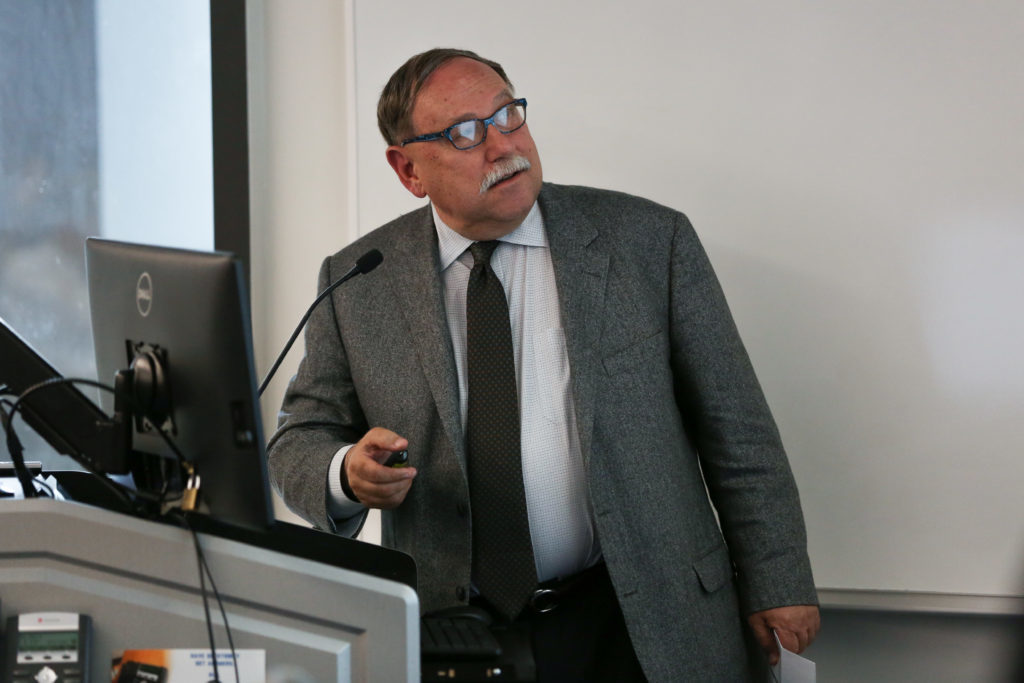After serving in three presidential administrations for nearly three decades, GW’s top financial administrator will resign this summer.
University Treasurer and Executive Vice President Lou Katz announced Wednesday that he will step down from his position to become an advisor to the University president in June and then plans to retire at the end of the year, according to a University release.
Katz – the last remaining senior administrator from former University President Stephen Joel Trachtenberg’s administration – was a GW mainstay who has led an office with oversight over the University’s financial and physical planning operations.
“The opportunity to serve GW as the institution evolved into a world-class university has been a tremendous honor,” Katz said in the release. “The greatest privilege has been meeting, working and mentoring our incredible students.”
University President Thomas LeBlanc said that without Katz, “GW would not be the institution it is today.” Katz will work as a full-time advisor to LeBlanc until the end of the year, focusing on “key real estate and business matters,” according to the release.
“It is the end of an era for the University, but not the end of Lou’s legacy, which will live on in the many projects he has led,” LeBlanc said. “His strategic abilities have helped this institution grow and thrive through some turbulent economic times.”
Katz came to GW in 1990 to serve as GW’s vice president and treasurer and was promoted to his current title in 2003. He currently leads the management of GW’s financial, real estate and information resources and oversees the operating and capital budgets. He also advises the president and the Board of Trustees on all financial and strategic issues.
During his tenure, Katz has advised on various construction and expansion projects, spending more than half a billion building up the Foggy Bottom Campus in recent years, and has led the Division of Operations since 2016.
He had a hand in projects that expanded the University, like the addition of the Mount Vernon Campus, the decision to build the $275 million Science and Engineering Hall and the revamp of the 2100 Pennsylvania Ave. property.
Katz was a major player in the development of the 2007 campus plan that will last for another nine years after he leaves and lays out the structure for the University’s development. He turned the University into a major player in D.C. real estate, buying up swaths of valuable land across the District to fund University projects.
He also helped expand the Virginia Science and Technology campus and finalize GW’s merger with the Corcoran College of Art + Design.
While expanding the University’s properties, Katz oversaw GW’s total debt as it steadily increased over the last 15 years. Katz created a strategy to refinance the University’s debt in 2014, when it reached an all-time high of $1.7 billion.
Katz was also involved in the decision to implement University-wide budget cuts and hiring freezes to make up for a budget shortfall. He planned to pay down the University’s extensive deficit in 2016 with revenue from the same properties that contributed to creating the debt.
Katz also saw criticism as part of former University President Steven Knapp’s administration. He was faulted after the business school dean overspent his budget by millions of dollars, but he defended the University-wide budget system. He was also at the helm as tuition increased by about 3 percent for four years in a row.
During his time at the University, Katz helped fill top leadership positions, like the vice president of human resources position eventually filled by Sabrina Ellis. He also oversaw shifts in GW’s Human Resources operations in the last few years.
Katz is one of the University’s highest-paid employees, with his compensation at times exceeding even that of the University president.
Chairman of the Board of Trustees Nelson Carbonell said he has worked with Katz for 15 years and that the long-serving official helped raise the school’s profile.
“Lou’s dedication to the university is unmatched,” he said in the release. “His strategic vision has helped GW grow our programs and facilities and enhanced our reputation as a global research institution.”





